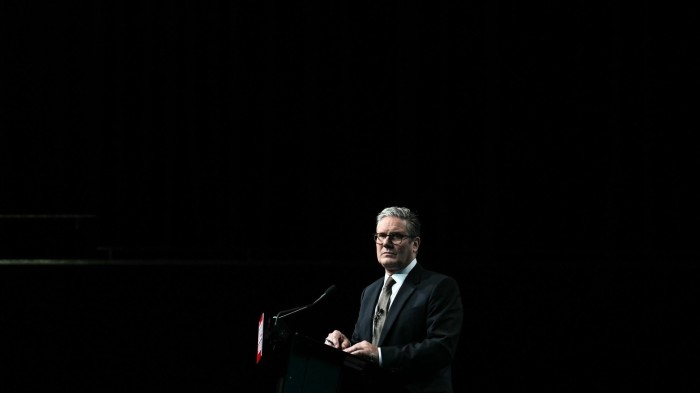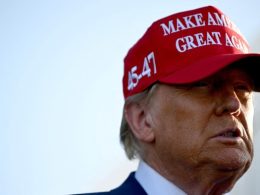One of the promised advantages of leaving the EU was that it would allow Britain to forge its own path in the world. With the re-election of Donald Trump, charting an independent route forward became more complicated.
Brexit has already left the UK adrift between American and EU trade and regulatory regimes — reluctant to tack too far one way or the other. Now the government is bracing itself for stark strategic choices on pivotal issues ranging from carbon pricing and AI regulation to trade tariffs when the president-elect enters the Oval Office in January.
Ministers and officials wonder whether Trump’s return could force the UK to make a decision — either to cleave to Washington or to veer towards Brussels — or whether Britain can still attempt to chart a middle path on a range of policy flashpoints.
Lord Peter Mandelson, the former Labour cabinet minister and EU trade commissioner — and a leading candidate to become the next UK ambassador to Washington — has said that the UK must look to “have our cake and eat it” when triangulating with Trump. That will mean seeking side deals with Washington in areas like digital trade and defence while continuing Labour’s current “reset” with trade and security ties in Europe.
Others are less optimistic. Walking a line between being both pro-European and Atlanticist will be difficult when it comes down to matters of substance, warns Charles Grant, the director of the Centre for European Reform in London.
“It seems clear that the UK government will look to walk a tightrope with the Americans; collaborating with the US on defence and lining up with the EU on trade and climate issues,” he says.
But, he adds, “the danger is we don’t keep anyone happy: we do just enough with the US to create doubts in European minds that we’re not trustworthy.”
Other trade experts and longtime Brussels watchers agree that the result of the US election has the potential to significantly complicate the UK prime minister’s efforts to reset relations with Brussels on a number of commerce and trade issues.
Trump will be returning to the White House in the new year just as the British government is seeking to finalise its pitch to the EU on how to deepen ties on trade, energy co-operation and security matters ahead of a planned EU-UK summit in the early spring.
“The big question is whether any kind of tariff exemptions or deal with the Trump administration requires a radically different approach to either regulation or trade — if the inconsistencies with the EU became too big, then it would make it difficult to get closer to the EU,” says Olivia O’Sullivan, director of the UK in the World programme at think-tank Chatham House.
It is not just about trade or defence: the UK could also find itself caught between Europe and the US over how to deal with China. The government will also have to navigate complex domestic political arguments about its approach that will probably revive many of the issues around the Brexit referendum.
Experts caution that there are downsides to pivoting in either direction — but also in failing to make a choice at all.
As Kim Darroch, former UK ambassador to the US, warns: “If you choose to leave the world’s biggest trading bloc and drift gently around in the Atlantic — and are not sure whether you want to join an American regulatory regime for trade or the EU one — it’s going to leave you looking very isolated.”
The success or failure of London’s attempts to thread the needle with Washington will depend in large part on how hard Trump’s new administration pushes for Starmer’s government to choose between dual trade regimes, according to trade experts.
John Alty, the former director-general of trade policy at the UK Department for International Trade during the last Trump presidency, says that Britain’s current trade agreement with the EU in theory left the country free to do side-deals with the US without affecting UK-EU trade.
The UK government would be looking to put together a package of “common interests” based around digital trade and supply-chain resilience in critical minerals. At the same time, London will be arguing to Washington that imposing economically damaging tariffs is self-defeating when it is also demanding Europe finds more money to pay for its own for defence.
US demands could include some carve-out for US exporters from a UK carbon border tax on imported goods which is due to be introduced in 2027, or politically more contentious “asks”, such as requesting that the UK admit US food products such as chlorine-washed chicken or hormone-raised beef as part of an offer for a full US-UK free trade agreement.

“That would obviously be very difficult and it would also torpedo the idea of a veterinary agreement with the EU, which the Labour government is currently seeking, and therefore muddy the atmosphere with Brussels,” Alty adds.
Among the concerns of some trade experts is how the UK will position itself between the US and the EU as they take fundamentally divergent approaches to regulation in areas such as climate, carbon taxes and supply-chain monitoring. For this reason, Marco Forgione, director-general at the Chartered Institute of Export & International Trade, believes it is “untenable” for the UK to have the best of both worlds.
While the US internal market is looking to sweep away regulatory requirements, the EU is taking a different view on ESG [environmental, social and governance], net zero, and supply-chain traceability, with all the compliance burdens that go with that, Forgione says.
“It leaves the UK highly exposed: if the UK is uncertain of where it sits between the regulated compliance environment in the EU and the deregulated sector in the US, then why sit in London?” he asks. “These are global companies, they don’t have to be here.”
The picture is complicated further by opposing approaches to China. Trump’s preoccupation with Beijing is clear: he has threatened to ignite a full-blown trade war, including 60 per cent tariffs on Chinese imports, and has appointed several China hawks to his cabinet.
By contrast, the Labour administration in Britain is stepping up diplomatic engagement with Beijing. This week Starmer became the first UK prime minister to meet Chinese President Xi Jinping in six years. On the sidelines of a G20 summit in Rio, Starmer proposed “deepening the partnership bilaterally on trade and investment, health, education and other areas of mutual interest”, according to No 10, and confirmed Chancellor Rachel Reeves will visit Beijing in 2025.
Nonetheless, while alive to Britain and China’s shared commercial interests, Labour has retained the Conservatives’ guarded approach against sharing sensitive technologies of the future, such as AI. The UK mirrored the Biden administration in creating a “small yard with a high fence” on goods and intellectual property with potential military applications, applying trade and transfer restrictions to China.
The risk is that Trump will go further — and expect the UK to follow suit. “The problem for Britain will be if the Trump administration starts expanding the yard and demanding more and more restrictions and controls, and vetoes the transfer of more goods to China which we do not regard as sensitive or dual use, but the result of American protectionism. That will make the UK and the EU very jumpy,” warns one senior Labour parliamentarian.
Some party figures believe the government should seek to barter a stronger economic security partnership between London and Washington, which takes a tougher line on China, with exemptions from Trump’s threatened tariffs on all imports to the US. This would seek to build on Britain’s deep defence and security relationship with the US.
Liam Byrne, Labour chair of the Commons business and trade committee, has proposed that the UK offer to tighten up its inward investment screening programme and introduce more robust export controls on technology transfers to Beijing in return for trade concessions.
But there is scepticism in other quarters about the plausibility of such a plan. Lord Peter Ricketts, former UK national security adviser, warns that “security and trade are difficult to trade off against each other”, adding: “I’m not sure it’s a good idea to try.”
A US “shopping list” is also likely to include a discussion around the UK imposing tariffs on Chinese electric vehicles. Unlike the EU and the US, the UK has so far declined to impose tariffs on Chinese EV imports.
That hypothetically leaves room for the UK to impose some tariffs without causing undue domestic disruption in the form of higher prices. But it risks souring relations with Beijing and causing legal headaches for London, according to Peter Hill, the former UK civil servant who served as chief executive of COP26 and is now visiting professor at the LSE’s Grantham Research Institute on climate change.

“It’s not as easy as simply ‘imposing tariffs’ at the behest of Washington. There is a legal process to be followed — an injured party needs to register a complaint, to begin with — and the UK, like the EU, remains committed to the law,” he says.
However, Brussels’ tough measures on Chinese EVs are at odds with its more open approach to trading with Beijing in general. “The EU has put tariffs on EVs, but that’s about trying to squeeze investment from China in a different direction — it’s not, unlike the US, trying to exclude it,” says Rana Mitter, professor in US-Asia relations at Harvard Kennedy School.
Moreover, he pointed out that while the US may shift away from green energy under Trump, the EU and the UK have both set out their plans to lean into the transition. “That provides a dilemma for the UK on trade. The UK might have to look more to the EU than the US, because its trajectory is closer to what the current UK government wants,” Mitter adds.
Domestic politics is also pulling Starmer in different directions. Part of the challenge for Britain in dealing with the Trump administration is that pro-Brexit cheerleaders led by Reform UK leader Nigel Farage may exploit their close links to the president-elect in order to drive a wedge between Britain and Europe.
Farage is adamant that “there are advantages to being an intermediary, a broker in the middle”. He says a bilateral sectoral deal with the US on financial services would be an “easy win” and “achievable in a relatively short time”, arguing that both London and New York are aligned in the barriers they want to scrap.
Scathing about potential repercussions from Brussels, he adds: “If we do a deal with the US, will the EU put sanctions on us? I doubt it. They might resent our privileged status, but so what?” Citing the faster growth the US economy has enjoyed over the EU’s in recent years, he says: “Where is the future? We have to take a view.”
Throughout the 2024 UK election campaign Farage accused the Conservatives of “failing” to deliver Brexit by not achieving a clean enough break with Brussels — something that a hard-bargaining Trump administration could help to achieve.
By the same token, pro-EU advocates in the UK say that the reality of negotiating with Trump would finally make the case for bolder re-engagement with the EU.
So far, the Starmer government has limited the extent of any reset with Brussels, particularly on trade matters, ruling out rejoining the EU single market and customs union or accepting any form of free movement of people, including even a mobility deal for young people.
Mike Galsworthy, the chair of the European Movement UK, which campaigns for a closer relationship with the EU, says that the “messy tug-of-love between the US and EU” would provide a political pivot-point in the discussion around Europe.

He predicts that while Farage, Trump, the pro-Brexit UK tabloids and the US rightwing influencers will try “to haul the UK into Trump’s orbit”, both the mainstream Labour party and other opposition parties will reject both Trump’s values and economics.
“Their instinct will be to turn up the heat on the government . . . demanding the UK urgently rebuild its relationship with Europe — on defence, on security, on mobility and standards,” he says.
The level of political pressure on the British government will in part depend on the actual impact of Trumponomics on the economy.
There are some reasons to believe it may yet be less than feared. The IMF has attempted to quantify the damage that a tit-for-tat trade war involving tariffs imposed by the US, Europe and China would cause. It found widespread levies, tax breaks, less migration and higher borrowing costs could hit global output by 0.8 per cent in 2025 and another 1.3 per cent in 2026.
While the UK would undoubtedly feel the effects of such a growth setback, it may prove to be less exposed to Trump’s policies than some of its other trading partners.
First, the UK’s small trade surplus with the US (or modest deficit, depending on who is compiling the numbers) means the UK is not viewed as a major offender when it comes to Trump’s ire, which is likely to be focused on countries that have large trade surpluses with the US such as China and Germany.

If there is a blanket tariff on all countries, the UK might get caught in the line of fire, says Paul Dales, UK economist at Capital Economics, a research business, but is unlikely to be at the top of Trump’s “naughty list”.
“We send a lot of services to the US, and the feeling here is that they are not going to be subject to any tariffs,” he adds.
In the goods sector, some UK industries could be badly affected, in particular pharmaceuticals and automotive, which are leading exporters to the US.
Analysts at Oxford Economics consultancy calculate that a “full-blown Trump” scenario in which across-the-board tariff increases are imposed, with the UK retaliating, would have relatively modest effects on UK growth.
“The only way it becomes a really big problem is if we see a much bigger global trade war,” says Andrew Goodwin of Oxford Economics.
Nevertheless, any economic hit would be unwelcome at a time when the UK growth backdrop is already looking acutely challenging for Reeves, the chancellor.
As Jonathan Reynolds, the business secretary, conceded this week, Trump’s election portended a “very significant moment for global trade”, warning that a full-blown trade war between China and the west would leave an open trading nation like the UK more deeply exposed than the US.
“We’ll be seeking what’s in the national interest — and the fact we have an independent trade policy makes it an explicitly UK decision,” he said. “But fundamentally the question will have to be: what is the hard-headed assessment of the best interests of the UK?”
Source link











